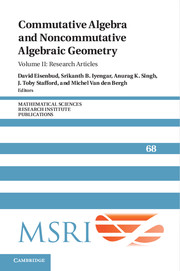Book contents
- Frontmatter
- Contents
- Preface
- When is a squarefree monomial ideal of linear type?
- Modules for elementary abelian groups and hypersurface singularities
- Ideals generated by superstandard tableaux
- Zariski topologies on stratified spectra of quantum algebras
- The derived category of a graded Gorenstein ring
- Singularities with respect to Mather–Jacobian discrepancies
- Reduction numbers and balanced ideals
- Unipotent and Nakayama automorphisms of quantum nilpotent algebras
- Formal fibers of prime ideals in polynomial rings
- Bounding the socles of powers of squarefree monomial ideals
- An intriguing ring structure on the set of d-forms
- On the subadditivity problem for maximal shifts in free resolutions
- The cone of Betti tables over a rational normal curve
- Adjoint associativity: an invitation to algebra in ∞-categories
Modules for elementary abelian groups and hypersurface singularities
Published online by Cambridge University Press: 29 May 2025
- Frontmatter
- Contents
- Preface
- When is a squarefree monomial ideal of linear type?
- Modules for elementary abelian groups and hypersurface singularities
- Ideals generated by superstandard tableaux
- Zariski topologies on stratified spectra of quantum algebras
- The derived category of a graded Gorenstein ring
- Singularities with respect to Mather–Jacobian discrepancies
- Reduction numbers and balanced ideals
- Unipotent and Nakayama automorphisms of quantum nilpotent algebras
- Formal fibers of prime ideals in polynomial rings
- Bounding the socles of powers of squarefree monomial ideals
- An intriguing ring structure on the set of d-forms
- On the subadditivity problem for maximal shifts in free resolutions
- The cone of Betti tables over a rational normal curve
- Adjoint associativity: an invitation to algebra in ∞-categories
Summary
This paper is a version of the lecture I gave at the conference on “Representation Theory, Homological Algebra and Free Resolutions” at MSRI in February 2013, expanded to include proofs. My goals in this lecture were to explain to an audience of commutative algebraists why a finite group representation theorist might be interested in zero dimensional complete intersections, and to give a version of the Orlov correspondence in this context that is well suited to computation. In the context of modular representation theory, this gives an equivalence between the derived category of an elementary abelian p-group of rank r , and the category of (graded) reduced matrix factorisations of the polynomial y1X p 1 +· · ·+yr X p r . Finally, I explain the relevance to some recent joint work with Julia Pevtsova on realisation of vector bundles on projective space from modular representations of constant Jordan type.
My goal here is to explain why a finite group representation theorist might be interested in commutative algebra, and in particular the Orlov correspondence [Orlov 2006]. I will then give an exposition of the Orlov correspondence for an arbitrary zero-dimensional complete intersection. Rather than go down the same route as Orlov, my description will be better suited to computation and will have the added advantage of giving a lift of this correspondence from the stable category to the derived category. Finally I shall explain the relevance to some recent joint work with Julia Pevtsova [Benson and Pevtsova 2012] on realisation of vector bundles on projective space from modular representations of constant Jordan type.
I should point out that Theorem 2.4, the main theorem of this paper, is a special case of Theorem 7.5 of Burke and Stevenson [2015]; even the functors realising the equivalences in the theorem are the same. The proof presented here uses a minimum of heavy machinery, taking advantage of the special situation in hand to reduce to an explicit computation involving the “bidirectional Koszul complex”, introduced in Section 5.
Information
- Type
- Chapter
- Information
- Commutative Algebra and Noncommutative Algebraic GeometryVolume 2: Research Articles, pp. 19 - 42Publisher: Cambridge University PressPrint publication year: 2015
